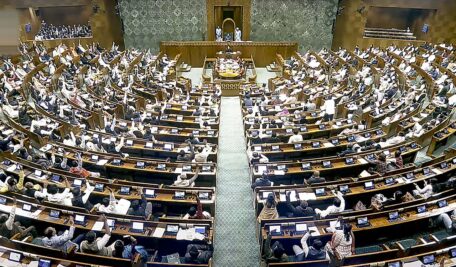Seven Congress MPs and one CPI(M) member were suspended from the Lok Sabha for the rest of the Budget Session for unruly behaviour, intensifying the government–Opposition standoff over Rahul Gandhi being denied an opportunity to speak on national security issues
Published Date – 4 February 2026, 12:42 AM

New Delhi: In an escalation of the tussle between the government and the opposition, seven Congress members and one CPI-M MP were suspended from the Lok Sabha on Tuesday for ‘unruly behaviour’ after they tore papers and threw them at the Chair.
Their suspension from the House for the remaining part of the Budget Session that concludes on April 2 will intensify the face-off with the government over various issues, including Leader of Opposition Rahul Gandhi being denied an opportunity to cite an article based on excerpts from an unpublished ‘memoir’ of former Army chief MM Naravane on India-China conflict of 2020.
The suspended members are Gurjeet Singh Aujla, Hibi Eden, C Kiran Kumar Reddy, Amarinder Singh Raja Warring, Manickam Tagore, Prashant Padole and Dean Kuriakose (all Congress) and S Ventakesan (CPI-M).
The opposition has also raised concerns about American President Donald Trump announcing the India-US trade deal and the alleged demolition drive at the Manikarnika Ghat in Varanasi.
As soon as the House met at 3 pm following multiple adjournments, Dilip Saikia, who was in the Chair, named the eight members.
Subsequently, Parliamentary Affairs Minister Kiren Rijiju read out a resolution seeking suspension of the eight members for the remaining period of the Budget session.
Moving the resolution seeking their suspension, Rijiju said the members acted in utter disregard to the House and the authority of the Chair.
They also tore papers and threw them on the Chair and were named by the Chair for their behaviour, the Minister added.
The suspended members had tried to climb on to the table of the Secretary General, tore papers and threw them at the Chair.
The House passed the resolution by a voice vote, following which the proceedings were adjourned for the day amid uproar.
Congress members, led by Rahul Gandhi, staged a protest outside Parliament building against the suspension of party members.
Later, Opposition MPs said the suspended members will continue to protest outside the House.
The suspended MPs also spoke with the media after coming out of the House.
Congress MP Tagore said, “This is an attack on the democracy of India, and we all know that the Prime Minister Modi does not want the Leader of the Opposition to speak.” “Yesterday, Opposition leader Rahul Gandhi ji was asked to submit authenticated documents on the book of General ( Former Army Chief) MM Naravane … Today, he did, and after that he was not allowed to speak. This has never happened… We protested that and then we were suspended,” he said.
Congress MP Eden said Gandhi was not allowed to speak in the House and that is why “we raised slogans and got onto the dais, and that is when we got suspended”.
“Eight of our members of the House were suspended, but we will continue our fight inside and outside Parliament. The members who are not suspended will fight inside,” he said.
Another suspended Congress MP Warring said, “If I tore a paper, why did that situation arise? Why was it forced upon us? Because you suppressed our voice. You suppressed the voice of the Opposition and the Leader of the Opposition. For two consecutive days, you have not allowed the respected Leader of the Opposition, Rahul Gandhi, to speak. Why?” Aujla, who was also suspended, slammed the BJP and said “they are disciples of Godse”.
Krishna Prasad Tenneti, who was in the chair earlier during the day said one member addressed the Chair as “yaar” and at that moment he took a stand and questioned the MP.
“Another member standing next to him questioned what was objectionable about saying ‘yaar’, which itself was inappropriate and should not have happened. Subsequently, they came down to the Table of the House and threw papers. These actions are objectionable,” he said.
Congress general secretary in-charge organisation K C Venugopal said the entire country is witnessing how the government is turning Parliament into a mockery.
“Yesterday, Rahul ji referred to an article from a magazine quoting the memoir of a former Army chief. At that time, the Speaker gave a ruling, on the government’s instructions, that books or magazines cannot be quoted unless authenticated. Today, even before starting his speech, Rahul ji sought permission from the Chair to authenticate the magazine. The Chair permitted it, and he authenticated the magazine and laid it on the Table of the House.” “Even then, he clearly stated that he was not quoting the book or the magazine, but was speaking broadly on the country’s internal security. Despite this, his microphone was switched off. If the Leader of the Opposition is not allowed to speak in Parliament, what will happen to parliamentary democracy,” Venugopal asked.
Suspended MP Krishna Kumar Chamala said, “We were suspended from Parliament for one reason: questioning the BJP and its governance. Over the past two years, Leader of Opposition Rahul Gandhi ji has often been disturbed by BJP MPs while speaking the facts. Even today, as he spoke on the President’s address, they tried to distract him to hide the truth from the people.
“This disruption is planned, with speakers sent specifically to distract him and prevent the failures of the BJP from being exposed,” he said.
Since Monday afternoon, the House has been witnessing uproar after Gandhi was disallowed to cite the article based on excerpts from Naravane’s unpublished book on India-China conflict of 2020.

